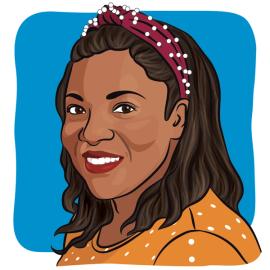- About Us
- Advertise / Support
- Editorial Board
- Contact Us
- CancerNetwork.com
- TargetedOnc.com
- OncLive.com
- OncNursingNews.com
- Terms & Conditions
- Privacy
- Do Not Sell My Information
- Washington My Health My Data
© 2025 MJH Life Sciences™ and CURE - Oncology & Cancer News for Patients & Caregivers. All rights reserved.
The Unseen Challenges of Survivorship

Tamron was diagnosed with peritoneal mesothelioma — a rare cancer caused by asbestos exposure — in 2007, as a 21-year-old new mother. As a woman diagnosed at just 21 years of age, she was anything but the typical mesothelioma patient. After more than a decade of living with mesothelioma, she began to share her experiences with others by blogging on Asbestos.com.
I had the wrong interpretation of what a cancer survivor was. That was until I was diagnosed with a rare cancer and shockingly, the term “cancer survivor” became a part of my journey.
Being on the other side of the diagnosis completely changed my perspective. Before my diagnosis, I had always assumed that being a cancer survivor meant that you had completed treatment and were now living cancer-free. I thought it was a straightforward process and that everything went back to normal once you were "cured" everything went back to normal. But my experience taught me that cancer is far more complex than that.
My journey as a cancer survivor has been anything but easy. It has been a roller coaster ride full of ups and downs, from the diagnosis to the treatment to the side effects and complications. But through it all, I have learned to appreciate life in a way I never did before.
What Is Cancer Survivorship?
You're a cancer survivor from diagnosis and your survivorship journey begins. Now that I have been on this survivorship journey for the last 16 years and counting, I still face challenges I didn’t know I would experience. I have also realized that being a cancer survivor is not just about being cancer-free. It is about the mental and emotional toll cancer also takes on you. It is about learning to live with the fear of recurrence, the uncertainty of the future and the physical and emotional scars cancer leaves behind.
- Managing long-term side effects of treatment - When given the green light on the proposed treatment, I didn’t question the doctor for a second. I was made aware of the side effects and things that could go wrong, but I wasn’t as concerned about that compared to my concern about getting rid of the cancer. The surgery was a success and did what it was intended to do. On the other hand, I experience side effects, such as chronic kidney disease and Anemia.
- Adjusting to body changes - Of course, you go into knowing your body will change, but I didn’t prepare for it. I mean, how could I have prepared? I am reminded every day by the almost 12-inch scar diverging down the middle of my stomach. Over the years, I have learned to be grateful for the scar and it gives me hope that miracles still happen and that I am a walking miracle.
- Coping with anxiety or fear of recurrence - Heard of scanxiety? I get this every time I have bloodwork or a CT scan. This happens without even trying to think about it. The mind is mighty; it creates our thoughts, shaping our beliefs and perceptions about the world. Learning various coping methods such as deep breathing, praying, journaling and cultivating positive thoughts helps combat anxiety and fear of recurrence.
- Navigating relationships with family and friends - I heard someone say, “You learn who your true friends are when you have cancer.” From my experience, I do see some truth in that. You may get friends or family members who feel sorry for you, some who don’t know what to say, or others who think they can't be around you anymore. Navigating those relationships can be challenging, especially when having relatability within those relationships is slim to none.
Despite all the challenges, I am grateful for the experience. It has taught me to live in the moment and appreciate life's little things. It has given me a newfound appreciation for my health, family and friends. And it has shown me that there is always hope, even in the darkest times. One of the things that has helped me on my cancer survivorship journey is finding a community that supports, nurtures and inspires me. This can be a group of friends, family members, fellow survivors, or even an online community of people who have been through similar experiences. Having people around you who understand what you're going through, who can offer advice and encouragement and who can be there to listen can make all the difference.
As a patient advocate and contributing writer, I have firsthand seen the power of connection and community. Sharing your story can be a powerful tool for your healing and for others who may be going through similar experiences. By reaching out and connecting with others, you can find a sense of belonging and support that can make all the difference in your journey. There is always hope and people want to help and support you. Reach out, connect with others and continue your survivorship journey.
For more news on cancer updates, research and education, don’t forget to subscribe to CURE®’s newsletters here.
Related Content:



